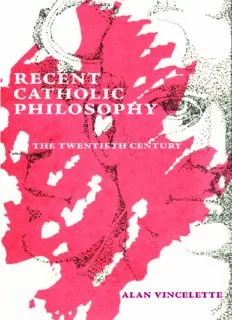
Recent Catholic Philosophy: The Twentieth Century PDF
Preview Recent Catholic Philosophy: The Twentieth Century
RECENT CATHOLIC PHILOSOPHY THE TWENTIETH CENTURY RECENT CATHOLIC PHILOSOPHY THE TWENTIETH CENTURY by AlAn Vincelette mArquette studies in philosophy no. 71 Andrew tAllon, series editor librAry of congress cAtAloging-in-publicAtion dAtA Vincelette, Alan Roy. Recent Catholic philosophy : the Twentieth Century / by Alan Vincelette. p. cm. — (Marquette studies in philosophy ; no. 71) Includes bibliographical references and index. ISBN-13: 978-0-87462-803-6 (pbk. : alk. paper) ISBN-10: 0-87462-803-2 (pbk. : alk. paper) 1. Christianity—Philosophy—History—20th century. 2. Catholic Church and philosophy—History—20th century. I. Title. BR100.V56 2011190.9’04--dc22 2011008997 © 2011 Marquette University Press Milwaukee, Wisconsin 53201-3141 All rights reserved. www.marquette.edu/mupress/ The paper used in this publication meets the minimum requirements of the American National Standard for Information Sciences— Permanence of Paper for Printed Library Materials, ANSI Z39.48-1992. TABLE OF CONTENTS Introduction .............................................................................................7 Chapter One: Phenomenology ..............................................................9 Stein.......................................................................................................14 Von Hildebrand ...................................................................................25 Dussel ....................................................................................................39 Chapter Two: Neo-Thomism ...............................................................43 Gilson ....................................................................................................45 Maritain ................................................................................................56 Wojtyła [John Paul II] ........................................................................69 Chapter Three: Transcendental Thomism ..........................................81 Rousselot ..............................................................................................83 Rahner ...................................................................................................97 Lonergan .............................................................................................104 Chapter Four: Personalism .................................................................117 Ebner ...................................................................................................117 Mounier ..............................................................................................121 Nédoncelle ..........................................................................................131 Chapter Five: Existentialism ..............................................................143 Lavelle .................................................................................................146 Marcel..................................................................................................161 Zubiri ..................................................................................................173 Chapter Six: Analytical Philosophy...................................................183 Anscombe ...........................................................................................184 Taylor ..................................................................................................195 Jacques .................................................................................................205 Chapter Seven: Postmodernism ........................................................213 Marion.................................................................................................214 Lacoste ................................................................................................228 Desmond .............................................................................................235 Conclusion ............................................................................................245 6 Recent CAtholic Philosophy The Twentieth Century Abbreviations .......................................................................................249 Notes .....................................................................................................255 Bibliography .........................................................................................417 Index ......................................................................................................429 introduction T his work continues the discussion of recent Catholic philosophy begun in Recent Catholic Philosophy: The Nineteenth Century (Milwaukee: Marquette University Press, 2009), treating Catholic philosophy through the end of the twentieth-century.1 There have been ap- proximately 3000 Catholic philosophers who made significant contri- butions to philosophy in the twentieth-century [including around 70 bishops, two popes—Leo XIII (1810-1903) and John Paul II (1920- 2005), and over 130 converts]. Hence a survey of twentieth-century Catholic philosophy cannot be anything but selective. I have hence chosen those who I think are the 21 most important and representative of the twentieth-century Catholic philosophers in seven major movements [with the percentage in each movement given in brackets]: Phenomenology [6%], Neo-Thomism [52%], Transcen- dental Thomism [8%], Personalism [4%], Existentialism [11%], Ana- lytic Philosophy [7%], and Postmodernism [4%]—two other com- mon movements in the twentieth-century are Augustinianism [4%] and Idealism, typically Hegelianism [1%]). Interestingly, Thomism— which makes up a combined 60% of twentieth-century Catholic phi- losophers—is particularly rare in the Continental philosophers born between 1930 and 1960 (except for Spain), even as it has maintained a popularity in America and Britain (and in Continental philosophers born after 1960). I discuss two philosophers in some depth and in- clude a shorter account of one additional figure for each movement (with a focus as before on Western European and North American thought, and also on epistemology, ethics, metaphysics, and the phi- losophy of religion).2 1 phenomenology 1900-2000 in Austria, Belgium, Germany, France, Liechtenstein, Netherlands, Poland, & the United States W ith the rise of National Socialism (1933-1945) under Adolph Hitler in Germany, the lives of two notable German Catholic phenomenolo- gists, namely Edith Stein and Dietrich von Hildebrand, were imperiled—and indeed in the former case tragically put to an end. A third celebrated thinker, Martin Heidegger, however, had already abandoned his Catholic roots and was now a member of the Nazi Party. Meanwhile, the Jesuit Al- fred Delp, who had written a book critical of Heidegger called Tragic Existence [Tragische Existenz] (1935), sadly and ironically suffered his own tragic existence and was put to death by the Nazis in 1945 on account of his efforts on behalf of the resistance group Kreisau Circle. Such was Catholic intellectual life in Austria and Germany during the Nazi Era. Initially the German Catholic bishops (who had earlier often been critical of National Socialism) agreed to a Concordat with the Nazi Party in 1933. This Concordat allowed for the continued functioning of the Catholic hierarchy, private Catholic schools, seminaries, chari- table organizations, and Catholic Theological Faculties at the universi- ties (though open advocacy for Catholicism was considered unprofes- sional in the German university system of the day), state funding of the Church, the publication of pastoral letters and Catholic journals, and expanded religious education in the public schools. In turn the Catholic Church agreed to forbid priests from making overt politi- cal criticisms of National Socialism, to disband the Catholic German Center Party, and to merge the Catholic Youth Organizations with the National Socialist Youth Organizations (the Hitler Youth and the
Description: